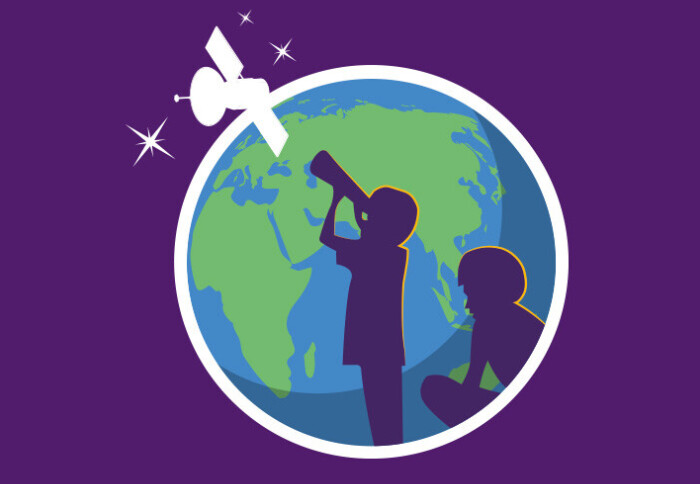How Imperial is helping build the next generation of space careers
by Jacklin Kwan

Satellite salesperson, space lawyer, astronaut psychologist – Imperial is broadening the horizons of what jobs in the space industry look like.
The United Kingdom Space Agency and Imperial College are launching a project aimed at raising awareness about the spectrum of careers in future space industry. I’m A Space Person aims to communicate the diversity of future space jobs to young schoolchildren, encouraging them to see themselves as potential space lawyers or space doctors.
“Unfortunately, when it comes to space, there’s often a tendency to only highlight astronauts or astronomers, whereas the space sector is so much more varied than that,” says Dr Martin Archer, who proposed the initial idea for the project.
“I saw the need to develop a resource that really showed anyone, whatever their qualities or interests, could pursue a career related to space,” he says.
Starting as a summer research project, I’m A Space Person is a website and a collection of print postcards with information that matches a child’s attributes and a job in space.
Being observant, resilient and self-motivated results in a potential career as a flight surgeon who monitors the overall health of astronauts on space missions. Being communicative, observant and tenacious means that a child could one day be a journalist investigating and reporting stories about space exploration and technology.

“Beyond just helping young people get a better understanding of the breadth and depth of careers available in the space sector, we aim to help parents, guardians and teachers to have more information when discussing careers with their children and students,” says Dr Simon Foster, the Outreach Manager for the Faculty of Natural Sciences.
The Science and Technology Facilities Council (STFC), which supports a range of leading space research organisations such as STFC RAL Space, provided funding for the project and the UK Space Agency is partnering with I’m A Space Person to provide career inspiration as part of their country-wide roadshow.
"We aim to help parents, guardians and teachers to have more information when discussing careers with their children and students." Dr Simon Foster Outreach Manager for the Faculty of Natural Sciences
The UK Space Agency’s Space for Everyone tour will travel to 10 locations across the UK this summer, showcasing the role of space in improving life on Earth and highlight the diverse and varied career paths open to young people looking to enter this fast-growing industry.
Ian Annett, UK Space Agency Deputy CEO, said: “We’re pleased to partner with Imperial College on I’m a Space Person which highlights the diversity of roles in the space sector and the opportunities to find a role in these exciting, growing areas."
"It also supports the UK Space Agency’s Space for Everyone tour of its full-size replica rocket around the UK this summer. Together we are highlighting the diverse opportunities available to young people, whatever their background or skill set, in one of the UK’s fastest-growing industries," he said.
Surveying the future of space jobs
Two Masters students, Cara Waters and Shafiat Dewan from the Department of Physics, were tasked in 2022 to research space sector careers resources. They began compiling lists of existing jobs in the space industry as well as jobs they anticipated would be created in the future.
“From the Imperial Space Lab, we got contacts from space industry and companies,” Waters says, “We looked at job listings and interviewed companies to see what they had done and what they thought needed to be done.”
Their research eventually evolved into the I’m A Space Person portal. Waters is now a research postgraduate at Imperial who has since continued to develop the project by helping to design the website portal and postcards.

The UK Space Agency acquired the Imperial project and it will now feature prominently during the roadshow which will take place between June and August. At the same time, printed postcards will be sent to classrooms around the country so that teachers can inspire their students to pursue futures in space.
The future is space
“There’s a big drive for the UK space sector to grow, with new jobs and opportunities are being created like at the new space ports being built,” says Dr Archer, “But to fill those jobs, young people need to realise all the different careers that support that industry and want to pursue one of them.”
Earlier this year, the UK Space Agency announced that the UK’s space sector has reached over £17.5 billion in income with nearly 49,000 jobs across almost 1,600 organisations. Many regions and cities are becoming hotspots for space investment, such as the Goonhilly Earth Station in Cornwall which provided telecommand for NASA’s Artemis 1 lunar mission.
"There’s a big drive for the UK space sector to grow, with new jobs and opportunities are being created like at the new space ports being built." Dr Martin Archer Department of Physics
As part of its initiative to encourage the UK’s role in space, the UK Space Agency’s national tour aims to raise awareness about the growing diversity of space-related careers.
Apart from the I’m A Space Person project, Imperial also has many other initiatives that aim to promote space careers in Imperial. Researchers from Imperial’s Space Lab – a multidisciplinary space-related research network – undertake public talks, outreach events and school visits.
Year 12 students can also get a better understanding of careers in the space industry by participating in Imperial’s Space Lab work experience programme.
“We have numerous schools visit Imperial and we talk to them about the various areas of space research being conducted,” says Dr Foster, “Especially in areas students may not have heard of, such as space Medicine and lunar mining.”
Article supporters
Article text (excluding photos or graphics) © Imperial College London.
Photos and graphics subject to third party copyright used with permission or © Imperial College London.
Reporter
Jacklin Kwan
Faculty of Natural Sciences